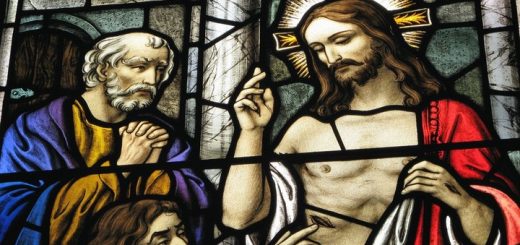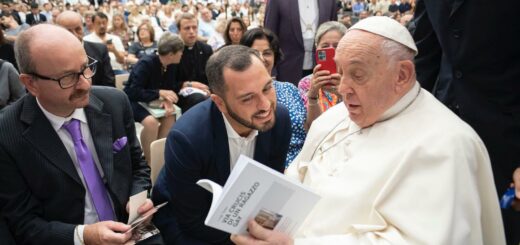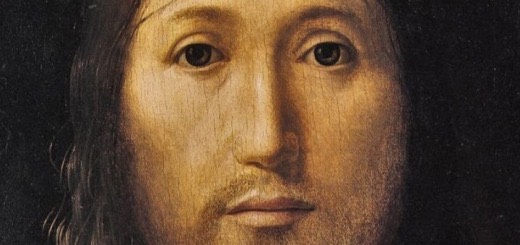The only barbed wire of Christians is that of the crown of thorns
Reflections by Alessandro Zaccuri published on to come on August 26, 2016
By now they also know it at the Meeting: when Father Antonio Spadaro speaks, the images follow one another in rapid succession. The polyhedron, Magellan's gaze, the washing of the feet, the barbed wire of the crown of thorns. «But don't let yourself be impressed – warns the director of Catholic Civilization –. I don't understand what I'm telling you either, talking about it together is a way to take some steps forward."
It's not a joke. Some statements that Pope Bergoglio gave him three years ago, in the now famous interview published by the Jesuit magazine, are only becoming clearer now, thanks to the experience that Spadaro is gaining following Francis' travels. "One of the men closest to the Pope", defines him Angelo Savorana, spokesperson for Communion and Liberation, at the opening of the meeting which reinterprets the 'diplomacy of Francis' in the light of "mercy as a political process". The interested party lets it go and immediately attacks: «Mercy is a polyhedron, it has many faces, which is why it is so difficult to understand. It is certainly not a pious feeling, but a strength that manifests itself in drama, when it is crossed by wars and conflicts, as happens today. This is why we are living in this time of mercy. And this is why in the 2013 interview the Pope insisted so much on the image of the Church as a 'field hospital'. It is an ecclesiological statement, not a metaphor."
Likewise, the silence that Francis chose to maintain in front of the execution wall in Auschwitz and, before that, in front of the wall that separates Israelis and Palestinians in Bethlehem is extraordinarily eloquent. «In both cases – recalls Spadaro – he limited himself to placing his hand on the wall. It may seem like a casual gesture, but in reality it has a profound meaning, which I was able to grasp thanks to a friend of Bergoglio, the Muslim Omar Abboud. Do as Jesus does, he told me, touch the wounds to heal them."
The sick world is also the "holy world" marked by the almost innumerable Holy Doors that Francis wanted to be opened during the Jubilee of Mercy. An initiative that, once again, Spadaro invites us to read from the point of view of a precise geopolitical vision. «Even before Rome – he reiterates –, the Holy Door was opened wide by the Pope in Bangui, in the Central African Republic, during a journey that had unforgettable moments. But also in Georgia, where Francis will go at the end of September, a Holy Door has been built directly in a meadow. The Church does not yet exist, but the Door to let mercy pass through does."
The mention of the Caucasian area helps Spadaro describe the journey that the Pope's travels are taking around Europe. «Without ever passing through the center – he observes –, just like a doctor does who, to detect the heartbeat, simply touches the wrist. Francis' gaze is the gaze of Magellan, who from America, the extreme border of the then known world, has a new perception of a capital like Madrid." From a European perspective, and not just an Italian one, Spadaro's trip to Lampedusa should be considered, the first stage of a journey that then touched Turkey and Albania, Bosnia and Poland. With an episode at the European Parliament in Strasbourg, however devoid of any political connotation. «Even for Pope Bergoglio, Europe has Christian roots – explains Spadaro – but these are not rooted in the past, in nostalgia for an era now over like that of Constantine. Today the roots of Europe lie in the washing of feet, in the desire to welcome, to think of itself not as a space to be defended but as a process of integration".
And how is all this done? «We don't know yet – Spadaro repeats – but at least we know what not to do. I find scandalous the chorus of those, even in the Church, who want an armed religion, ready to entrench itself behind barbed wire barriers. The only barbed wire a Christian knows is that of the crown of thorns. Loving your enemy is difficult, I'm the first to know, yet this is what the Gospel asks of us. Demanding, as some do, that the Pope condemn Islam wholesale means not having understood the objectives of jihadist terrorism, which feeds on a mystique of conflict that is the exact opposite of mercy. Only by escaping this apocalyptic logic will we be able to find an answer to the great question that Francis is asking Europe. And this question is not 'who are you?', but 'what do you hope for?'".






